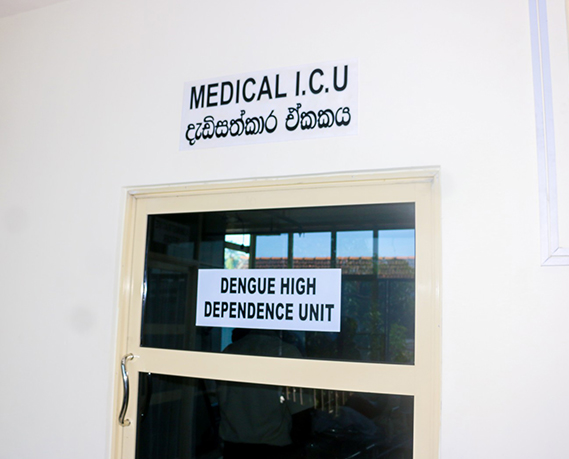
Intensive Care Unit (ICU)

Intensive care is needed if someone is seriously ill and requires intensive treatment and close monitoring, or if they're having surgery and intensive care can help them recover.
Our ICUs have 24-hour monitoring and immediate care access to hospital support services such as laboratory, imaging and surgery.
Equipment that may be used on an ICU of Nawinna Medicare Hospital includes:
- a ventilator – a machine that helps with breathing; a tube is placed in the mouth, nose, or through a small cut in the throat (tracheostomy)
- monitoring equipment – used to measure important bodily functions, such as heart rate, blood pressure and the level of oxygen in the blood
- IV lines and pumps – tubes inserted into a vein (intravenously) to provide fluids, nutrition and medication
- feeding tubes – tubes placed in the nose, through a small cut made in the tummy, or into a vein if a person is unable to eat normally
- drains and catheters – drains are tubes used to remove any build-up of blood or fluid from the body; catheters are thin tubes inserted into the bladder to drain urine
Visiting an ICU
An ICU can often be an overwhelming place, both for the patient and their loved ones. It can therefore help to know a little about what to expect.
- Visiting hours – visiting hours are usually very flexible, but there may be times when visiting isn't advised so it's a good idea to check before you arrive. The number of people allowed around the person's bed may be limited.
- Hygiene rules – to reduce the risk of spreading infection, you'll be asked to clean your hands when entering and leaving the unit and you may not be able to bring in certain things such as flowers. Avoid visiting if you're ill.
- How patients may look and behave – the person you're visiting may be drowsy and seem confused. They may also appear slightly swollen or have injuries such as bruises or wounds. This can be upsetting to see, but staff will ensure they're as comfortable as possible.
- ICU equipment – a series of tubes, wires and cables will be attached to the patient, which may look alarming at first. Ask staff to explain what these are if you'd like to know.
- Unfamiliar sounds – you may hear alarms and bleeps from the equipment. These help staff to monitor their patients.
Recovering from intensive care
Once a person no longer needs intensive care, they can be transferred to a different ward to continue their recovery before eventually going home.
Some people may leave the ICU after a few days. Others may need to stay in the ICU for months, or may deteriorate there.
Many people who leave an ICU will make a good recovery. But sometimes there can be lingering problems, such as:
- weakness and stiffness
- fatigue (extreme tiredness) and a lack of energy
- loss of appetite and weight loss
- sleep problems
- depression, anxiety or post-traumatic stress disorder (PTSD)
- problems with mental abilities – for example, not being able to think clearly, and being forgetful